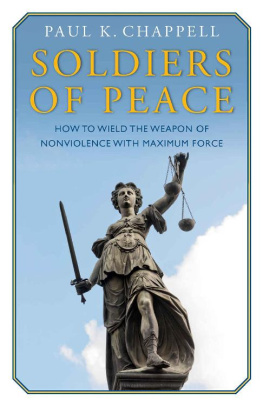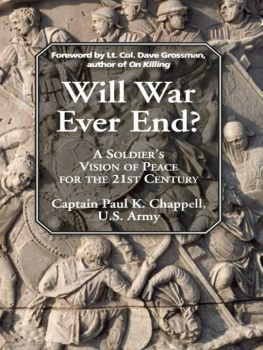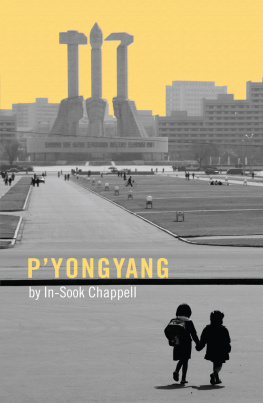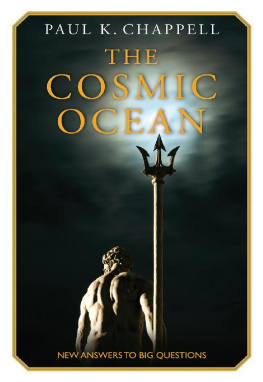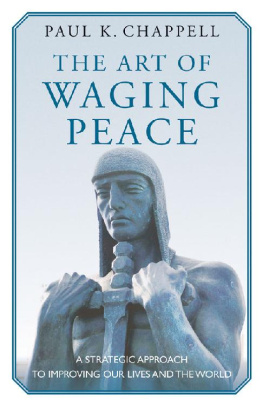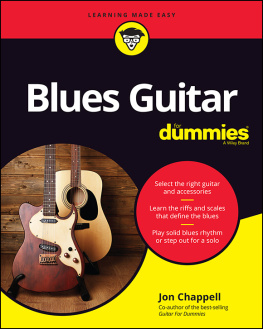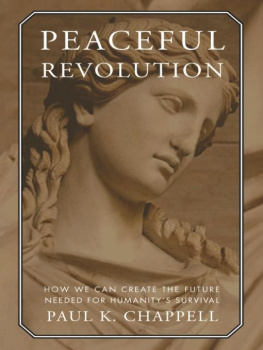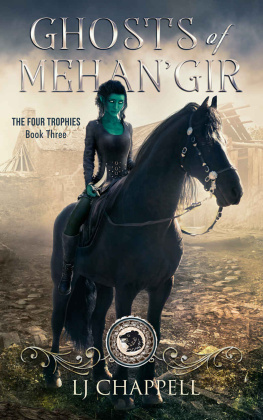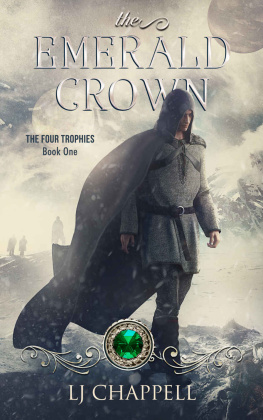Paul Chappell - Soldiers of Peace
Here you can read online Paul Chappell - Soldiers of Peace full text of the book (entire story) in english for free. Download pdf and epub, get meaning, cover and reviews about this ebook. year: 2017, publisher: Easton Studio Press, LLC, genre: Politics. Description of the work, (preface) as well as reviews are available. Best literature library LitArk.com created for fans of good reading and offers a wide selection of genres:
Romance novel
Science fiction
Adventure
Detective
Science
History
Home and family
Prose
Art
Politics
Computer
Non-fiction
Religion
Business
Children
Humor
Choose a favorite category and find really read worthwhile books. Enjoy immersion in the world of imagination, feel the emotions of the characters or learn something new for yourself, make an fascinating discovery.
- Book:Soldiers of Peace
- Author:
- Publisher:Easton Studio Press, LLC
- Genre:
- Year:2017
- Rating:5 / 5
- Favourites:Add to favourites
- Your mark:
- 100
- 1
- 2
- 3
- 4
- 5
Soldiers of Peace: summary, description and annotation
We offer to read an annotation, description, summary or preface (depends on what the author of the book "Soldiers of Peace" wrote himself). If you haven't found the necessary information about the book — write in the comments, we will try to find it.
Soldiers of Peace — read online for free the complete book (whole text) full work
Below is the text of the book, divided by pages. System saving the place of the last page read, allows you to conveniently read the book "Soldiers of Peace" online for free, without having to search again every time where you left off. Put a bookmark, and you can go to the page where you finished reading at any time.
Font size:
Interval:
Bookmark:
Will War Ever End?
A Soldiers Vision of Peace for the 21st Century
The End of War:
How Waging Peace Can Save Humanity, Our Planet, and Our Future
Peaceful Revolution:
How We Can Create the Future Needed for Humanitys Survival
The Art of Waging Peace:
A Strategic Approach to Improving Our Lives and the World
The Cosmic Ocean:
New Answers to Big Questions

Contents
For all those working to create a more peace literate world.
I regard myself as a soldier, though a soldier of peace. I know the value of discipline and truth.
Mahatma Gandhi
Nonviolence is a powerful and just weapon. It is a weapon unique in history, which cuts without wounding and ennobles the man who wields it. It is a sword that heals.
Martin Luther King Jr.
Soldiers of Peace is the sixth book in the seven-book Road to Peace series. This book series, which can be read in any order, is about waging peace, ending war, the art of living, and what it means to be human. Soldiers of Peace focuses on five new forms of literacy we must achieve to solve our most serious problems and survive as a global family.
Literacy in our shared humanity
Literacy in the art of living
Literacy in the art of waging peace
Literacy in the art of listening
Literacy in the nature of reality
These new forms of literacy empower us to become soldiers of peace who can wield the weapon of nonviolence with maximum force. Rather than merely addressing surface symptoms, the weapon of nonviolence confronts the underlying problems that threaten peace, justice, happiness, and human survival. To heal the root causes of our personal, national, and global problems we must also journey toward the constellation of peace. This book discusses how the four stars in the constellation of peace emit a light that can guide us toward survival, prosperity, gentleness, and greatness.
I am not a pessimist or an optimist, but a realist. Today the word realism is rarely used to describe reality, but has instead become a disguise for cynicism. As I show in my other books, I am a realist because extreme trauma, a lifetime of studying the human condition, and my experiences in the military have allowed me to understand the many causes of violence and rage, along with their potential cures. As I will show in this book, I am a realist because I perceive the nature of time realistically, which has given me an abundance of realistic hope.
My existence has also given me realistic hope. In 1958 only 4 percent of Americans supported interracial marriage between blacks and whites. By 2013 the amount of support had grown to 87 percent. I am living proof of the change in attitude toward interracial marriage, because my mother is Korean, my father was half black and half white, and I grew up in Alabama.
My father, Paul B. Chappell, was born in 1925 and grew up in Virginia during the Great Depression. Half black and half white, he lived under segregation. My father was a career soldier who served in the army for thirty years and retired as a command sergeant majorthe highest enlisted rank. He met my Korean mother while he was stationed in Korea. They married in 1975, and I was born in Maryland in 1980 when he was fifty-four years old. My parents moved to Alabama when I was a year old. I was their only child.
Since my childhood, my father told me that the only place in America where a black man had a fair chance was in the army. Because he grew up before the civil rights movement, and the army had desegregated prior to the major civil rights victories, he believed that black men were treated better in the army than in civilian society. In fact, one of the influences that led Rosa Parks to oppose segregation was her job as a secretary on a desegregated military base. Historian Jeanne Theoharis, in her book The Rebellious Life of Mrs. Rosa Parks, tells us:
One further insult in Montgomery [Alabama] came from the disconnect between the treatment blacks encountered on the integrated trolley on Maxwell Air Force Base and the citys segregated buses and other public spaces. Indeed, blacks and whites worked together at the Maxwell base, which had an integrated cafeteria, bachelor hall, and swimming pool. Rosa had worked at Maxwell for a time, and [her husband] Raymonds barber chair was on the base. You might just say Maxwell opened my eyes up, Parks noted. It was an alternative reality to the ugly policies of Jim Crow. Parks sometimes rode the bus [on the military base] with a white woman and her child, sitting across from them and chatting. When they reached the edge of the base and boarded the city bus, she had to go to the back. Thus, Rosa Parks had direct personal contact with desegregated transportation in her own hometown. This visceral experience highlighted the sheer arbitrariness of segregated public transportation and made riding the city bus even more galling.
My parents pressured me to go to West Point, not only because they thought I would have limited opportunity as a result of being part black, but also because they had seen how white people, African Americans, and Koreans rejected me as a racially mixed outcast. After all, white people were not the only ones who opposed interracial marriage, which was illegal in nearly all southern states prior to the 1967 Supreme Court decision Loving v. Virginia. Marrying when interracial marriage was still controversial in many parts of the country, my parents did not feel welcome in African American or Korean communities. Many Koreans did not like that my mother had married a black man, and many African Americans did not like that my father had married an Asian woman.
When I told my mother in 2009 that I was leaving the military, she shouted, Are you out of your mind? Nobody is going to hire you. Its bad enough you look Asian, but youre also part black. Nobody is going to give a job to a black man who looks Asian.
My parents did not tell me lies. On the contrary, they told me their truth. They were describing life as they had experienced it and trying to protect me from the suffering they endured.
I left the army in 2009 as a captain and began working as the Peace Leadership director for the Nuclear Age Peace Foundation, a nonprofit organization cofounded by its current president, David Krieger. When I told my mother about this new job, she asked me, When David Krieger hired you, did he know youre part black?
Yes, I replied.
She said, Well you need to thank him, because he is a white man and he hired you, even though he knew you were part black. I have thanked David Krieger in words many times for giving me the opportunity to work full-time for peace, and I thank him with my actions by doing my best to serve the mission of peace.
The United States of America is far from perfect today and has a long way to journey on the road to peace, but Id much rather be part Asian and part African American in 2015 (the year I am writing this book) rather than before the civil rights movement in 1915 or during slavery in 1815. Today I often meet people who respond in a positive way to my mixed racial background, which is something I could not imagine as a child in the 1980s. This is also something my father, who died in 2004, could not imagine. Again, our country has a long way to journey on the road to peace, but if we have made progress, why cant we make more progress?
Font size:
Interval:
Bookmark:
Similar books «Soldiers of Peace»
Look at similar books to Soldiers of Peace. We have selected literature similar in name and meaning in the hope of providing readers with more options to find new, interesting, not yet read works.
Discussion, reviews of the book Soldiers of Peace and just readers' own opinions. Leave your comments, write what you think about the work, its meaning or the main characters. Specify what exactly you liked and what you didn't like, and why you think so.

